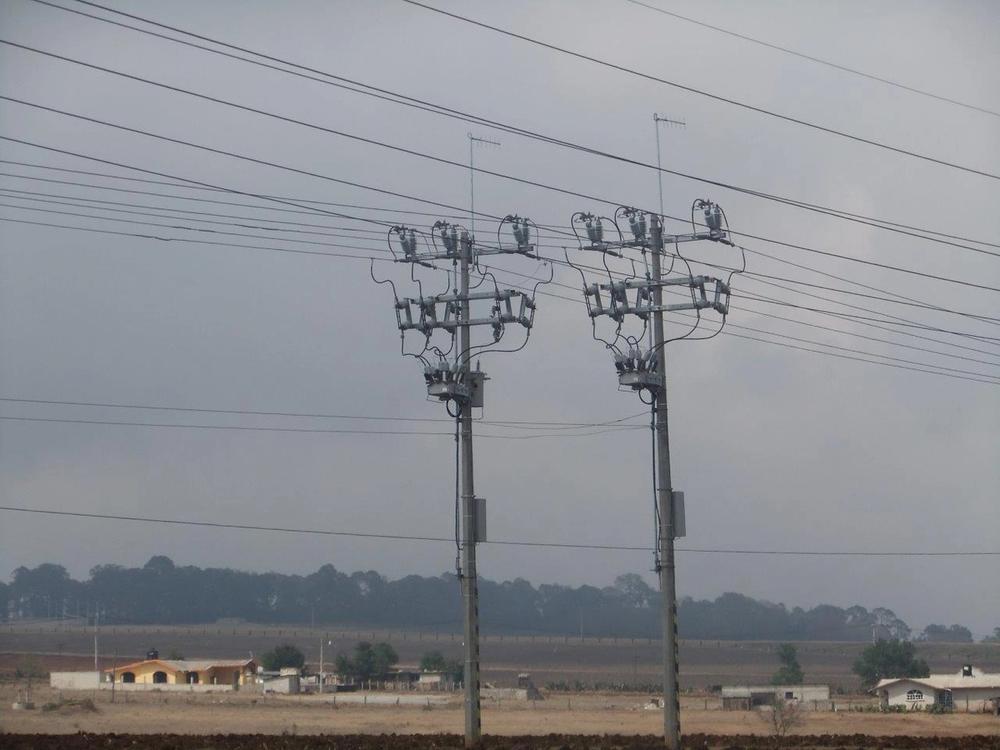Press Release
Published 05/2016
NOJA Power’s OSM Automatic Circuit Reclosers passes ESKOM’s environmental testing at the Koeberg Insulator Pollution Test Station in South Africa
NOJA Power’s ACRs reliability to protect electrical utilities distribution networks in any environment has been confirmed by South African utility ESKOM by passing arguably the harshest environmental ageing and pollution tests in the industry.

Electrical switchgear engineers NOJA Power today announces the successful completion of independent environmental testing by South African utility ESKOM on NOJA Power’s three phase OSM series Automatic Circuit Recloser (ACR or “auto recloser”). NOJA Power’s OSM 15, OSM 27 and OSM 38 reclosers were individually tested over a 12-month period at the Koeberg Insulator Pollution Test Station (KIPTS), one of the most highly polluted locations in the world.
The purpose of ESKOM’s environmental testing is to validate the insulator performance of products when exposed to extended periods of pollution and varying weather patterns in real world environments. Sources identify that insulator field failure is related to at least 70% of line outages, while others sources claim that it can even be as high at 90% [1][2]. Reliability of insulator performance is therefore paramount for utilities to ensure a reliable distribution network to their customers, and to reduce operating costs.
The high rate of insulator failure is generally caused from environmental ageing and surface contamination of the insulator. Prolonged exposure to the environment reduces the hydrophobicity (water repellent ability) of the insulation material, causing an increase in the leakage current on the insulator surface. The increase in leakage current results in the insulation material deteriorating over time and can eventually cause electrical breakdown in poorly designed insulating systems.
The current rate of insulator failure due to environmental exposure provides electrical utilities significant cost saving opportunities by selecting products with insulation systems that have been designed and tested to work in any environment. South African utility ESKOM conducts natural ageing and pollution tests at KIPTS on all products to internally validate insulator performance for industrial and marine environments before they are accepted for use.
The high pollution levels at KIPTS provide the perfect conditions to evaluate the performance of insulators in real world conditions. Located 50 meters from the coast at Cape West Coast in South Africa, the pollution index of 2000 μS/cm at KIPTS3 is classified as ‘very heavy’ according IEC 60815. Insulators are tested in 12-month cycles to expose them to the wet and dry seasons, and are closely monitored to validate their performance.
ESKOM states, “Insulating products are exposed to diverse environmental conditions, which include high pollution levels, frequent wetting cycles, ultra-violet radiation and variant wind conditions.” According to ESKOM, “KIPTS constitutes the ideal marine and industrial pollution condition in which to evaluate insulator products.”
“Over the years we found the ESKOM testing to be the most arduous real world environment under which our switchgear would be required to operate and as such, certifying our products at KIPTS has been an important part of our R&D development process to ensure our products are suitable for use in high pollution environments in any country in the world,” commented NOJA Power’s Group Managing Director, Neil O'Sullivan.
The validation by ESKOM of the insulator’s performance in NOJA Power’s OSM Series provides utilities the confidence that their distribution networks will be protected in the world’s harshest environments. The reliability of the NOJA Power’s OSM series is a testament to the quality design of the insulation system, and the significant investment in product validation processes.
As part of NOJA Power’s Research and Development process, insulator products are validated through accelerated ageing tests internally during the product’s development. The internal validation provides utilities the confidence that the insulators will perform in real world environments, as ESKOM’s testing demonstrates.
NOJA Power internally validates the environmental performance of insulators in NOJA Power’s Reclosers against international standards. The environmental validation testing consists of accelerated artificial ageing tests, such as the 1,000-hour artificial ageing test conducted in compliance with IEC 62217 at NOJA Power’s Salt Fog test laboratory. The accelerated ageing testing is just another step to ensure that the OSM Series will meet utilities requirements for reliability.
As Neil O’Sullivan explains, “Artificial ageing testing has its place in the product development process and it can assist with validating today’s polymer products to withstand high pollution laden environments.”
The successful completion of KIPTS environmental testing not only validates the reliability of NOJA Power’s OSM series for any environment, but also confirms that the internal testing conducted during the R&D phase of all NOJA Power products are reliable indicators of real world performance.
“Utilities globally recognize the KIPTS testing as the most arduous in the world and products that pass this test with high pollution ratings are suitable for use anywhere in the world,” as summarized by Neil O’Sullivan on the significance of passing ESKOM’s testing.
The combination of the intensive artificial and natural ageing tests ensures that the NOJA Power’s OSM series will provide electrical utilities maximum product life and reliable protection of distribution networks in the world’s harshest environments.
References
1. Ravi, S., Shaffner, D. and Clark, W (2005) ‘Utilities Share Their Insulator Field Experience’, Transmission and Distribution World.
2. Ibrahim, A. and Zakariya, A. (2003) ‘Silicone Rubber Insulators Withstand Desert Conditions’, Transmission and Distribution World.
3. ESKOM (2002) “KIPTS Natural Ageing and Pollution Performance Test Procedure for Outdoor Insulator Products Section 0 – General Requirements,” SCSPVACI3.
About IEC Standards
The International Electrotechnical Commission publishes standards for electrical, electronic and related industries. International standards ensure ensure that manufacturers develop products that meet defined specifications. IEC 62217:2012 (“Polymeric HV insulators for indoor and outdoor use – General definitions, test methods and acceptance criteria”) the accelerated ageing test methods and passing criteria for insulators in indoor and outdoor environments.
Want to stay up to date with Electrical Distribution Technology?
Join our list for a free weekly technical bulletin, as we share our Global Electrical Engineering experience directly to your inbox.
Subscribe →